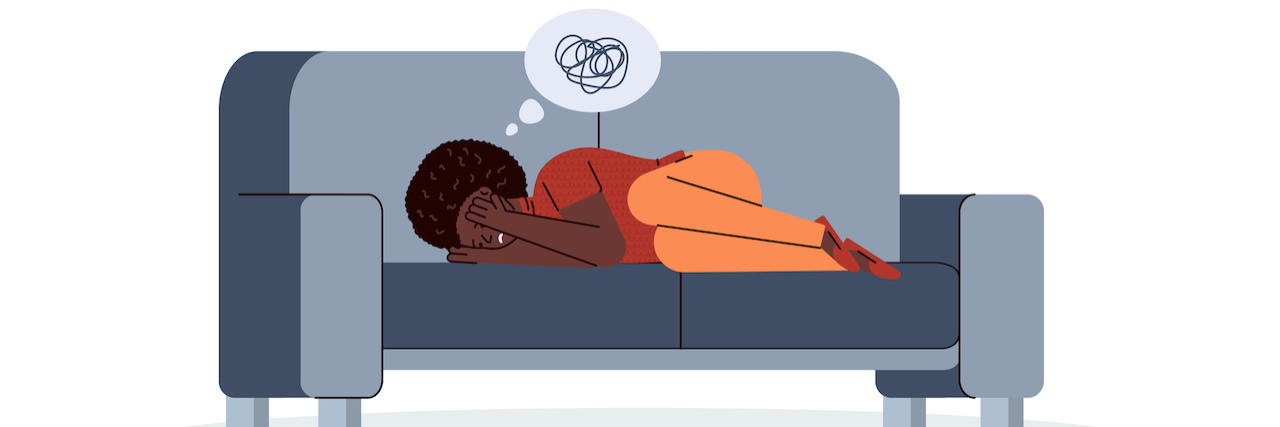I think whether you have had a health condition since birth or whether you have acquired one throughout your life, I would say most people have moments/day/weeks/months of finding it emotionally challenging, and that’s totally OK. It may cause anxiety due to your body changing or causing scary symptoms to having low moments of “why me,” or adapting to life where they may not be a cure to your illness or missing out on events with others – of course there are only a few examples.
However, I think what a lot of people go through with illness is grief. This may sound ridiculous because you haven’t lost someone, but you are grieving for the life you had planned but now are not able to have. Or you are grieving for perhaps losing your ability to do certain things, maybe losing your employment or relationships with others. I am going to explain each stage of grief a bit more and reassure everyone that you are totally human for experiencing these emotions.
Denial: refusing to accept reality and protecting yourself from acceptance.
Denial with a chronic illness or rare disease can affect people physically and mentally. Denial can make symptoms or illness worse if a person is in denial because they may be carrying on with day to day tasks that they now either shouldn’t be doing or their body doesn’t have the ability to do anymore. This is tough to deal with because everyone wants to be able to carry out tasks and not be held back, so refusing to accept this is normal. Denial can also affect you emotionally. Adapting to a new life is hard, so sometimes refusing to accept reality is a defensive mechanism rather than perhaps having tough, irrational thoughts towards your illness as these are often harder to cope with.
Anger: an intense emotional state involving a strong uncomfortable response.
The keywords and phrase that come to mind when thinking about anger as part of the grieving process is “why me?” and “I feel different,” which no ones wants to feel. As people we want to fit in to society and want to be able to keep up with our peers, so being angry towards your rare disease and chronic illness is OK. Some people might feel angry due to their illness because it had stripped parts of them away; whether that is because you used to always be out at social events but now cannot, you might feel angry because you may have lost your job or because you are in pain a lot of the time and therefore resent your condition.
Bargaining: feeling vulnerable and helpless.
Bargaining can be quite similar to the next stage of grief (depression), but in this stage you may feel like you need or want to regain control of the situation. During this stage you may be thinking of the “what ifs” or “if only,” which can be common with chronic illness or rare disease. With illness, you may be feeling “what if I had gone to the doctor sooner” or “if only I had noticed this symptom before.” But please remember none of this is your fault and sometimes illness can be so much of surprise.
Depression: a low mood that lasts for weeks or months and affects your daily life.
Depression can affect many people for a variety of reasons, not just those with illness. Depression can be on a huge spectrum from mild thoughts and minimal disruption to your life to experiencing debilitating symptoms and needing treatment or intervention to ensure you are kept safe to yourself and others. Depression with chronic illness or rare disease can occur because you may experience chronic pain and not imagine being able to live the rest of your life in that pain, you may be going through some grueling treatment and not seeing light at the end of the tunnel or you may be going through regular flare-ups resulting in to a poor quality or life and low mood. Of course, they are many other reasons depression could occur and it is different for everyone. Depression can really impact someone’s life and it is important to realize that you are not alone, you deserve support and you are so brave.
Acceptance: the process or fact of being received as adequate, valid or suitable.
This is the last element of the grief cycle which can really help people with rare disease and chronic illness. Acceptance can really help people adapt to their rare disease and accept feelings of vulnerability when they do arise. Acceptance of a chronic illness can help someone both physically and mentally. Physically because when symptoms or flare-ups do occur, the person can accept that the need to rest or perform self-care tasks which can maintain or improve their condition. Whereas, acceptance can help someone mentally because it isn’t necessarily making anxious or negative thoughts go away, it is about acknowledging them, accepting they do arise from time to time and not getting angry at yourself for struggling with your illness.
As you can see, emotions throughout grief can be really hard and for those experiencing illness. You may experience the grief cycle on a regular basis, which can be exhausting physically and mentally. If you feel that you need extra help, there is no shame in reaching out to a counselor, doctor or someone else you can trust. Dealing with a rare disease or chronic illness is tough, so it is OK to get support to lighten the load.
Getty image by Kudryavtsev Pavel

